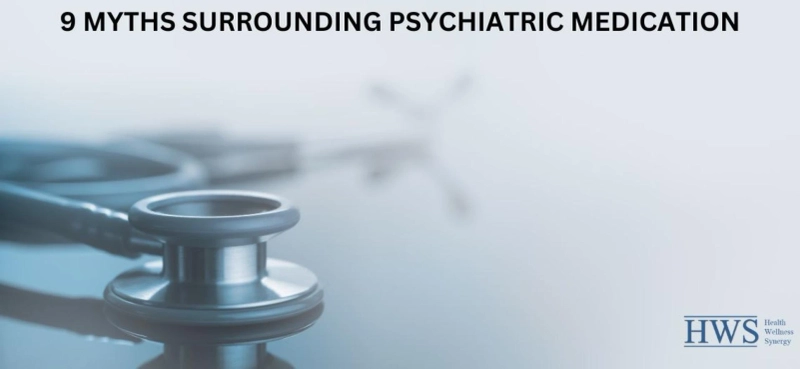Psychiatric Medication – Myths & Facts
Psychiatric medication (or psychoactive drugs) refers to the drugs that are used to help people living with mental health disorders, often for those who respond little to therapy and counselling. These drugs are built to act on the chemical makeup of the brain and the nervous system.
In this scenario, there should be more information and less stigma about both mental health disorders and psychiatric medication, which is sadly not the case.
Numerous myths surround the use of psychoactive drugs for treating mental disorders, all of which are debunked by facts.
A little bit about mental health medication
Fact: The type and dose of medication that we’re prescribed for our mental health will depend on our diagnosis, symptoms, history, any other medications you regularly take, other health conditions you have, your personal wishes, and any other life circumstances that are going on for us.
In general, they fall into four categories; antidepressants, antipsychotics, sleeping pills and tranquillisers, and mood stabilisers.
MYTH #1 – Drugs will cure me as soon as I ingest them
Fact: 4-6 weeks to show effects
MYTH #2 – Once you start taking medication, you have to be on it for life
Fact: This varies. Some people might need to take their medication indefinitely. Others might need it for a set period of time – from a number of months to a couple of years.
MYTH #3 – I can discontinue my medication when I feel better
Fact: Even if people start feeling better, it is recommended that they continue the medication through the time prescribed. Stopping medication too soon can lead to a relapse of the Bipolar disorder or of its symptoms. It is better to let the change stabilise before going off drugs.
MYTH #4 – Medication just masks the problem, it doesn’t actually deal with it
Fact: This one depends on what our problem is. If our problem is entirely due to circumstance.
Medication doesn’t ‘fix’ circumstantial problems we have, but it can improve some of our symptoms, helping us to cope.
Antidepressants can help to improve our serotonin levels, lifting our mood enough to tackle any life-issues. Antianxieties can calm our anxiety enough that we’re able to leave the house and access support. Antipsychotics can reduce our symptoms, perhaps getting us to a point where we’re able to find activities that we enjoy again. Mood-stabilisers can stop us from feeling so impulsive.
Medication doesn’t deal with our problems directly, but nor does it mask them. It allows us to reach a point where we’re able to cope with them and learn ways of managing them.
MYTH #5 – It’s better to live with my symptoms than deal with the side-effects of medication
Fact: While side-effects may feel scary, they should not be the reason you deny Ketamine treatment. As your body gets accustomed to the new chemicals, there may be instances of dizziness, drowsiness, dry mouth and nausea. But these taper off within days.
However, after advice from your doctor, you can engage in exercise, and seek a readjustment of the time of administration and dose of the drug to mitigate these side-effects.
MYTH #6 – People who take medication are weak
Fact: There is no weakness in seeking help for mental well-being. In fact, it is an act of bravery to accept your illness and work towards improving it.
Since visiting a doctor for flu or jaundice is considered normal, why should you not visit an expert and take medicines for the health of your mind?
Further, wherever medication fails to help with environmental stressors or cannot change the course of life events, it can ensure that the distressing symptoms remain under control so that people can actively seek therapy and support groups to bring out their best.
MYTH #7 – Mental health medications are addictive
Fact: This depends on the medication we take. Some medications, such as benzodiazepines, can be addictive and should be carefully monitored by a medical professional. Other medications aren’t addictive but we may have withdrawal effects when we come off them. For that reason, we will often come off a medication gradually and should never stop taking it without medical guidance.
MYTH #8 – You can’t take medication if you’re pregnant
Fact: This myth is complicated and doesn’t have a straightforward answer.
Some mental health medications aren’t advisable to take during pregnancy. Others may pose less of a risk; sometimes this is because there isn’t enough data to prove definitely whether they have an effect on an unborn child or not.
It’s absolutely vital to speak to a medical professional about our medication if we’re planning to become pregnant, or are pregnant. Medications might pose a risk to our unborn child. Often, it comes down to weighing up the risks – would continuing with our medication(s) pose more or less of a risk to our baby than stopping them would pose to our mental health. This is an individual decision. Our health professional should be able to help us decide whether to continue with our current medication(s), swap to a different one(s), change our dose(s), and/or come off our medication(s) altogether.
MYTH #9 – People who take medication for their mental health don’t really need it
Fact: Doctors aren’t in the habit of prescribing medicines to people who don’t need them.



